Real Chinese Food – Dinner Posted by sasha on Feb 17, 2016 in Culture
If you were looking for some orange chicken and fortune cookies you’ve come to the wrong place, because we’re introducing real Chinese food here. So far, we’ve taken a look at breakfast and lunch, so check those posts first if you missed out. I hope you’re still hungry, because dinner (晚餐 – wǎn cān) is a big deal in China!
An Epic Meal
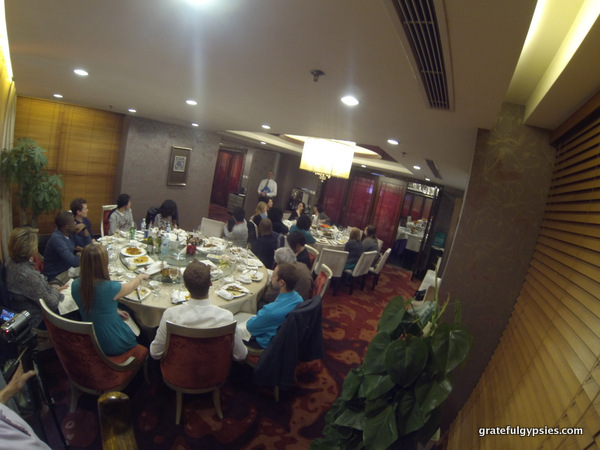
Just another dinner in China.
In case you haven’t noticed by now, Chinese people love to eat. They love it so much, in fact, that a very common greeting in China is “Have you eaten yet?” (你吃饭了吗? – nǐ chī fàn le ma). Nowhere is the love for all things food more common in China than at the dinner table. Simply put, Chinese people do not mess around when it comes to dinner. Whether eaten at home or in a restaurant, dinner tends to be a marathon eating session with multiple dishes. This should come as no surprise, seeing as how many people eat a quick meal for both breakfast and lunch as a result of busy work days. Dinner is a time to gather with family or friends, load your plate, chat, and often tip back a few drinks in the process. Needless to say, you’d better show up hungry if you’re doing dinner with Chinese people.
The Stages of a Chinese Dinner
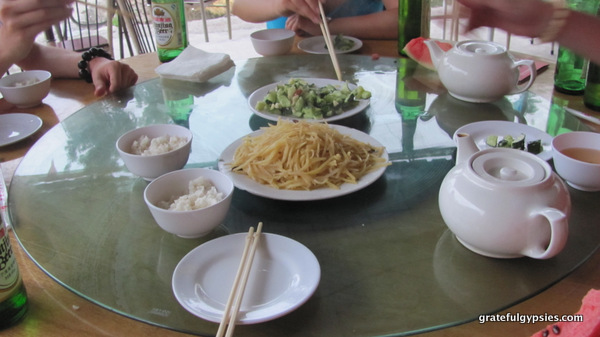
Some typical cold dishes.
Obviously, dinner customs and dishes vary greatly across the vast country. However, there are a few stages to a Chinese dinner that are pretty common. To start off, a lot of people like to eat cold dishes (凉菜 – liáng cài), sort of like how many Americans like to start off with a salad. Here are a few common cold dishes that start out a Chinese dinner:
-
cucumber salad (拍黄瓜 – pāi huáng guā)
-
“wood ear” mushrooms (木耳 – mù ěr)
-
lotus root (莲藕 – lián ǒu)
Whereas a Western dinner may continue with a main course paired with a few side dishes, things are a bit different in China. There isn’t really such a thing as a main course – rather, many dishes are brought out one at a time. Generally, there will be a few dishes with meat or fish, some vegetable dishes, and of course some staple foods such as rice, noodles, or dumplings.
Unlike in Western countries where soup (汤 – tāng) is traditionally served earlier on in the meal, the soup usually comes last in a Chinese dinner. So when you’re eating out in a real Chinese restaurant and they bring your fish before your soup, don’t worry – they didn’t forget it, they’re just following the standard Chinese custom.
Dessert isn’t exactly big in China, at least not accompanied with dinner. That’s probably because people already eat so much at dinner that there’s no room for dessert (甜点 – tián diǎn). If there is anything that would be considered dessert like, it’s probably going to be a fruit plate of some sort. It’s not that sweets aren’t popular in China – because they certainly are – just not at the dinner table.
A Family Affair
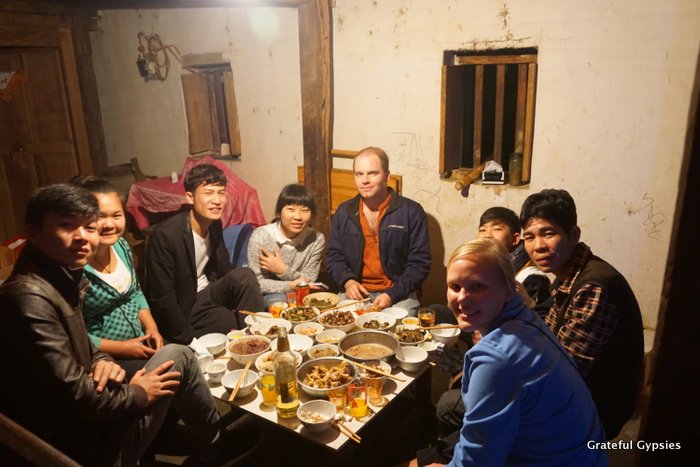
New Year’s Dinner in the village.
In the US, eating dinner at home and in a restaurant are quite different experiences. Usually people eat family style at home, sharing a variety of dishes around the table. When eating out, however, people usually order their own main course and maybe share something like an appetizer or dessert. This is not the case in China, where meals are a family affair no matter where they take place. Restaurants usually have large, circular Lazy Susan tables to facilitate big group dining. Every dish is shared, and there is almost always far too much food. Should you find yourself dining out with a group in China, you’d better have your chopstick skills up to par – it can be tough snagging a piece of chicken on a spinning table. Once you can grab a single peanut while in motion on a Lazy Susan, you know you’re a chopstick expert.
Common Dishes
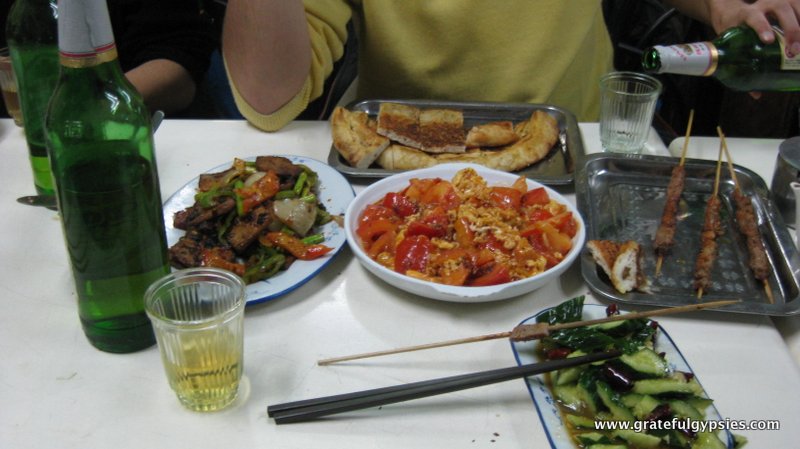
Xinjiang food – oh so delicious.
What people eat for dinner very much depends on where they live, as culinary styles vary greatly across China. A dinner table in Beijing will look different from one in rural Sichuan. The dishes in a coastal city in Guangdong will look nothing like those presented in the far reaches of Xinjiang. As such, there aren’t really any dishes that are common at dinnertime throughout the country. That being said, there are plenty of constants in the dining experience. Regardless of where you are in China, people love eating meat and fish – sorry vegetarians. The type of meat/fish and the way in which it is prepared will vary depending on the region. For a more in-depth look at the different cuisines around the country, check our posts on the Great Culinary Traditions of China. There’s also always a staple food in abundance at the dinner table. For most parts of the country that’s rice, but it can also be naan bread in Xinjiang or rice noodles in Yunnan.
Some Personal Favorites
I absolutely love eating dinner in China. It’s just so much more fun than back at home. Sitting around a Lazy Susan in a crowded, noisy restaurant with a group of friends, sharing a variety of dishes, laughing, telling stories, and drinking endless tiny cups of beer is always a good time. Whenever I go out to dinners back in the US, I find myself sitting there thinking, “Wow is this boring!” and I miss the hell out of China. Although dinners in China are always great, I do have my favorites.
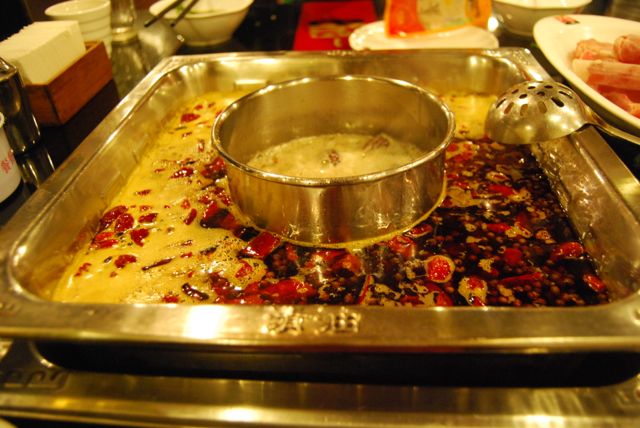
Mmm… hot pot.
Perhaps my favorite Chinese dinner experience is hot pot (火锅 – huǒ guō). It’s sort of like fondue, only way better. Read my post on how to “Cure the Winter Blues with Hot Pot,” and then check out this video of Old Beijing Hot Pot:
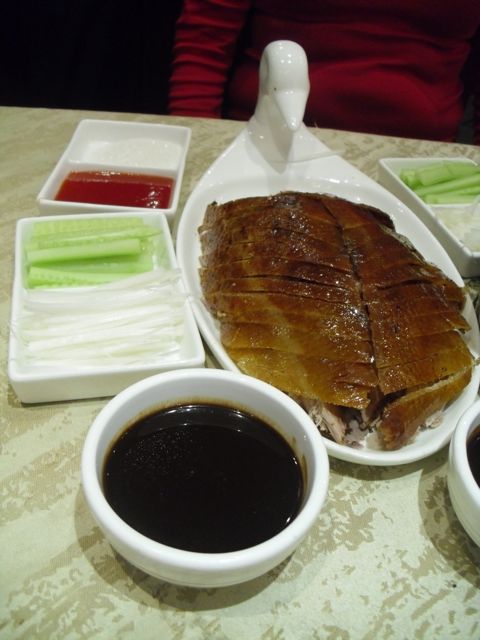
The imperial bird – Beijing roast duck.
Speaking of Beijing, it’s hard to beat that delicious, crispy bird known as Peking roast duck (北京烤鸭 – běi jīng kǎo yā). That was always our go-to dinner for visitors or for special occasions such as birthday parties, and it was always great. For more, check my post “The Imperial Bird – Beijing Roast Duck.” If you want to see me eat duck brains, you can also take a look at the video:
Chances are you’ve gotten your fill of real Chinese food by now, but we’ve still got a bit more to talk about. Stay tuned for future posts on popular snacks, desserts, and drinks in the Middle Kingdom.

Build vocabulary, practice pronunciation, and more with Transparent Language Online. Available anytime, anywhere, on any device.
About the Author: sasha
Sasha is an English teacher, writer, photographer, and videographer from the great state of Michigan. Upon graduating from Michigan State University, he moved to China and spent 5+ years living, working, studying, and traveling there. He also studied Indonesian Language & Culture in Bali for a year. He and his wife run the travel blog Grateful Gypsies, and they're currently trying the digital nomad lifestyle across Latin America.




Comments:
Samuel:
Good!!!!!!!!